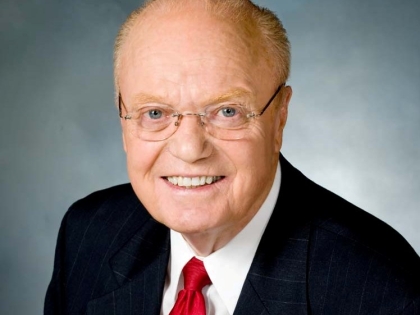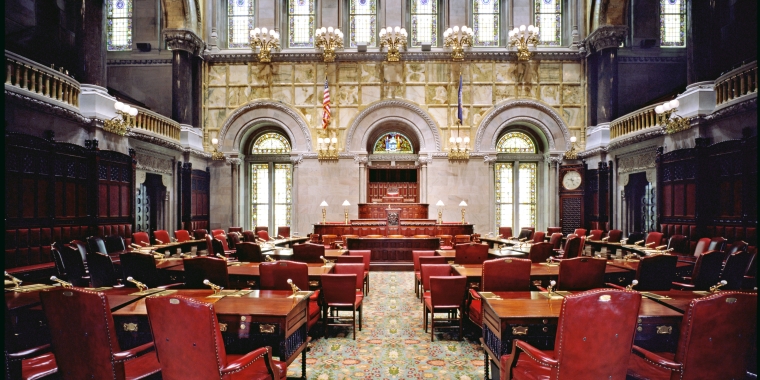
Sen. Farley and Medicaid Task Force Targets Waste, Fraud and Abuse
Hugh T. Farley
March 17, 2010
-
ISSUE:
- Medicaid
On March 17th, State Senator Hugh T. Farley (R, C, I - Schenectady) and members of the Senate Republican Conference released the initial report of the Senate Republican Task Force on Medicaid Fraud and Reform, a sweeping set of policy recommendations that will empower localities to boost their own Medicaid fraud efforts, more aggressively combat waste and the overutilization of services, and save taxpayers up to $500 million a year. The report should be discussed as part of this year’ budget negotiations.
The recommendations include authorizing the referral of all fraud cases to local district attorneys, per their request, in order to reduce the amount of time it takes to prosecute fraud, while permitting counties to keep a portion of all fraud recoveries they obtain.
In addition, the Task Force recommends allowing counties to have access to the State Medicaid Data warehouse so they may use additional information to uncover billing patterns that may suggest fraud or the overutilization of services. The Task Force also calls for creation of a new automated system to alert counties when their residents become incarcerated, and therefore, ineligible for Medicaid.
Through testimony from a data mining company, the Task Force learned that ensuring generic drugs are properly dispensed when the physician does not specify a brand name drug would save approximately $300 million alone.
As part of legislation approved by the Governor and supported by legislative Democrats, localities are no longer able to review Medicaid recipients income and assets. The Task Force recommends reinstatement of the asset and resource test for Medicaid eligibility determinations and to include the local department of Social Services (DSS) Fraud unit as part of the application process.
Additional Task Force recommendations include:
* Requiring recipients to choose a primary doctor and a primary pharmacist, similar to managed care plans.
* Allowing elected comptrollers, treasurers, or other appointed officials to audit Medicaid claims.
* Preventing individuals from being forced to go to other counties or states for long-term care.
Currently, overall Medicaid program expenditures in New York total nearly $52 billion a year, or approximately $1 billion a week. New York now spends 70 percent more than the national average on Medicaid, and more than California and Texas combined.
If New York spent 60 percent more than the national average, it would reduce expenditures by $2.2 billion, and save state taxpayers nearly $900 million, Republicans noted.
If no action is taken, Medicaid expenditures are expected to grow 37 percent over the next four years, adding another $5 billion to our projected budget deficit.
The Task Force report released today paints a chilling picture of a State Medicaid program rife with abuse, costing taxpayers billions of dollars a year in unnecessary or fraudulent expenditures. Shockingly, one in five New Yorkers are currently enrolled in Medicaid.
Members of the Task Force collected testimony and background information detailing the extent of Medicaid fraud in New York, including a Brooklyn dentist who billed Medicaid for 991 procedures in a single day - - even pulling and filling all 32 teeth on one patient - - as well as a physician who prescribed $11.5 million worth of a synthetic hormone popular with bodybuilders.
In addition, Medicaid was billed 153 times by an ambulette company that transported a single passenger two to three times a week to the doctor for an entire year. Typically, Medicaid covers up to $31 dollars each way for ambulette rides, however, in many of these instances the State paid for a ride that never took place. Out of all 50 states, New York spent the most on transporting patients to hospital and doctor’ appointments, approximately $316 million in one year alone.
Instead of scaling back the State’s generous Medicaid program or stepping up efforts to eliminate fraud, the 2009-10 state budget approved by the Governor and legislative Democrats eliminated the eligibility requirements for face-to-face interviews, finger-imaging and asset tests for applicants for Medicaid that are conducted by counties. The interviews are intended to ensure accountability in the system, but will no longer be required as of April 2010. In addition, counties have been encouraged by the State’s Department of Health to relax eligibility requirements to allow many more individuals to qualify.
"Medicaid is the largest part of our state budget, and a huge burden on localities," said Senator Hugh Farley. "If we are going to do anything to solve our fiscal crisis, Medicaid fraud and Medicaid reform have to be addressed."
Senate Republicans have long been at the forefront of efforts to reform Medicaid to achieve significant savings for taxpayers, and won passage of a 2006 law that capped the growth in the county share of Medicaid costs, saving counties hundreds of millions of dollars.
In 2006, the Senate also passed legislation, which was enacted into law, that:
* Created a new, independent Office of Medicaid Inspector General by consolidating responsibilities and staff from six agencies into the new Office and empowering the Medicaid Inspector General with the ability to detect, investigate and recover improper Medicaid payments;
* Provided county governments with new incentives and access to information to become active partners in the fight against Medicaid fraud;
* Enhanced the capacity of the Department of Health and Office of Medicaid Inspector General to fight fraud with new, state-of-the-art technology;
* Established new protocols and procedures to ensure the effective sharing of information and evidence regarding Medicaid fraud between the Office of Medicaid Inspector General, the Attorney General’s Medicaid Fraud Control Unit, county governments and district attorneys;
* Required health care institutions to implement corporate compliance programs and allowing providers to request advisory opinions to ensure proper billing practices, and
* Created new Health Care Fraud offenses to aid in the criminal prosecution of Medicaid fraud.
The Task Force’s recommendations were based on, but not limited to, testimony provided by County Executives and County District Attorneys at a March 8th public forum.
Share this Article or Press Release
Newsroom
Go to Newsroom2015-2016 EXECUTIVE BUDGET PROPOSAL INFORMATION
January 22, 2015
Governor Releases His Budget Proposals, Legislature Begins to Review
January 21, 2015
Library Use Up in New York State
January 21, 2015
NYS Legislature Schedules Joint Budget Hearings
January 20, 2015
